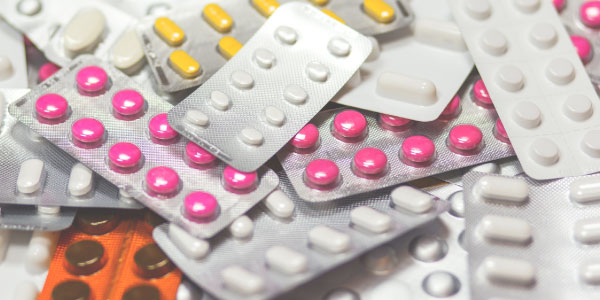
All medications come with their share of side effects, and many of them can actually impact on your oral health. While certain prescription medications, such as the antibiotic tetracycline, have been well-noted for having the ability to cause enamel discoloration, many people don’t realize that some over-the-counter medications can also damage your teeth in surprising ways. Here are some of the most common medications you can get without a prescription that may affect your teeth:
Antihistamines
These common allergy medications can cause discoloration of the teeth from prolonged use. Antihistamines are designed to block histamine, which the body produces during an allergic reaction, thus alleviating symptoms. Unfortunately, they also block the production of saliva, resulting in dry mouth and encouraging the growth of tooth decay causing bacteria. A chronically dry mouth means those bacteria populations aren’t kept in check and can lead to severe tooth decay in the long term.
Decongestants
Often used in tandem with antihistamines, decongestants are designed to unblock mucus from the nose and throat in order to help you breathe. As with antihistamines, they tend to cause dry mouth. Saliva normally keeps the teeth and inside of the mouth coated and inhibits the growth of bacteria, but when someone suffers from dry mouth, the bacteria that cause tooth decay are able to thrive and increase the likelihood of cavities.
Antacids
Most commonly available in a chewable tablet, antacids not only cause dry mouth but also contain a lot of sugar. This can create an acidic environment in the mouth that tooth decay causing bacteria thrive in.
Aspirin
It’s important to note that aspirin is highly acidic and should be taken according to the directions to avoid erosion of the teeth. Always swallow aspirin whole with plenty of water without holding it against your teeth. Never chew a capsule or tablet as its high acidity has been shown to damage tooth enamel.
Cough Syrup
Syrup-based medications, such as those used to alleviate coughs or those made for children, contain high levels of sugar and have a sticky texture. They leave an acidic residue on the teeth that greatly increases the chances for tooth decay and enamel erosion if left for long periods of time. Be sure to brush afterwards or at least rinse with plain water to wash away some of the residue, especially if you take it right before bedtime.
Vann Family Dental is always here to answer any dental health related questions you have.
We are pleased to offer high quality, comprehensive, and compassionate care.
